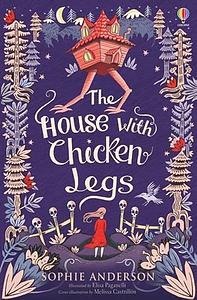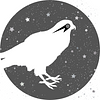Take a photo of a barcode or cover
adventurous
lighthearted
reflective
fast-paced
Plot or Character Driven:
Character
Strong character development:
Yes
Loveable characters:
Yes
Diverse cast of characters:
No
Flaws of characters a main focus:
Yes
adventurous
emotional
reflective
slow-paced
Plot or Character Driven:
Character
Strong character development:
Yes
Loveable characters:
No
Diverse cast of characters:
Yes
Flaws of characters a main focus:
Yes
Fascinating world setting, a poignant story on what it means to live
I loved the concept of a magical halfway house between this world and the afterworld, and absolutely hated the execution of it in this book.
First, there is the "Slavic word soup" that sounds more like name dropping, or piled up "exotic" decorations, but the interpretation of the Yaga character is very different from all the Slavic folklore tales about Baba Yaga that I am familiar with. So, if it's not the same Yaga as in the folklore tales, then why use that reference at all? Just for the house with the chicken legs?
If it were a completely different fantasy world, with a house that had some local beast's legs, there wouldn't have been an issue with all the cultural misrepresentation and discrepancies.
This seemed too close to cultural appropriation and left a very unpleasant aftertaste.
Second, there are the characters: The main character and the Yaga who raised her. I can't decide who made me more upset and outraged. The adult who failed so fundamentally in bringing up the child, or the child who stubbornly refused to learn any lessons from her repeated mistakes — same ones, over and over and over again! She is careless and irresponsible to the point of cruelty, because everyone around her constantly suffers from her actions and she keeps at it — hurting everyone around her all the way to the end, all while being quite content to go on doing so and not caring... But then, it's hard to tell how much of that is the fault of the person who raised her to be this almost-psychopath-level selfish. To the credit of the author, given the portrayal of that particular adult, I could easily see how the child's behavior could have been the direct product of her upbringing. The adult was plenty aggravating, too.
Needless to say, following these characters was frustrating.
And finally — the ending: it's presented as this happy neatly tied bow with all-is-finally-well bright future, but given the main character's lack of growth, care and understanding, the only feeling the book left me with was the dread for the new characters who had come into the main character's orbit towards the end of the book — none of them deserved this menace to be visited upon them!
First, there is the "Slavic word soup" that sounds more like name dropping, or piled up "exotic" decorations, but the interpretation of the Yaga character is very different from all the Slavic folklore tales about Baba Yaga that I am familiar with. So, if it's not the same Yaga as in the folklore tales, then why use that reference at all? Just for the house with the chicken legs?
If it were a completely different fantasy world, with a house that had some local beast's legs, there wouldn't have been an issue with all the cultural misrepresentation and discrepancies.
This seemed too close to cultural appropriation and left a very unpleasant aftertaste.
Second, there are the characters: The main character and the Yaga who raised her. I can't decide who made me more upset and outraged. The adult who failed so fundamentally in bringing up the child, or the child who stubbornly refused to learn any lessons from her repeated mistakes — same ones, over and over and over again! She is careless and irresponsible to the point of cruelty, because everyone around her constantly suffers from her actions and she keeps at it — hurting everyone around her all the way to the end, all while being quite content to go on doing so and not caring... But then, it's hard to tell how much of that is the fault of the person who raised her to be this almost-psychopath-level selfish. To the credit of the author, given the portrayal of that particular adult, I could easily see how the child's behavior could have been the direct product of her upbringing. The adult was plenty aggravating, too.
Needless to say, following these characters was frustrating.
And finally — the ending: it's presented as this happy neatly tied bow with all-is-finally-well bright future, but given the main character's lack of growth, care and understanding, the only feeling the book left me with was the dread for the new characters who had come into the main character's orbit towards the end of the book — none of them deserved this menace to be visited upon them!
adventurous
emotional
inspiring
reflective
sad
fast-paced
Plot or Character Driven:
A mix
Strong character development:
Complicated
Loveable characters:
Yes
Diverse cast of characters:
Complicated
Flaws of characters a main focus:
Yes
An unusual middle grade fantasy about destiny and choice. The protagonist is not terribly likeable & there are some flaws in the premise - she chooses to not pass through to death but then doesn’t want to be a guardian? I guess it’s about the teen years of rejection and separation and finding oneself and also understanding that people are not what they seem.
The house itself is an amazing character and the descriptions are wonderful.
The house itself is an amazing character and the descriptions are wonderful.
adventurous
emotional
fast-paced
Plot or Character Driven:
A mix
Strong character development:
Yes
Loveable characters:
Yes
Flaws of characters a main focus:
Yes
It's not how long a life, but how sweet a life that counts."
The House with Chicken Legs was fun, exciting, adventurous and sad.
This book felt quite mature to me. It deals with loss and grief, which was kind of refreshing to see in a middle-grade book.
I loved the idea with the house, the Yaga's and how Marinka fits into the story. I enjoyed most of the characters even though our main character here, Marinka, was at times quite stupid and silly, which did annoy me a bit but I guess that's all part of "growing up".
I recommend this to people who have a love for Fantasy and Slavic mythology.
The House with Chicken Legs was fun, exciting, adventurous and sad.
This book felt quite mature to me. It deals with loss and grief, which was kind of refreshing to see in a middle-grade book.
I loved the idea with the house, the Yaga's and how Marinka fits into the story. I enjoyed most of the characters even though our main character here, Marinka, was at times quite stupid and silly, which did annoy me a bit but I guess that's all part of "growing up".
I recommend this to people who have a love for Fantasy and Slavic mythology.
emotional
lighthearted
sad
medium-paced
Plot or Character Driven:
Character
Strong character development:
Yes
Loveable characters:
Complicated
Diverse cast of characters:
Yes
Flaws of characters a main focus:
Yes
adventurous
dark
hopeful
mysterious
sad
tense
medium-paced
dark
emotional
mysterious
sad
medium-paced





